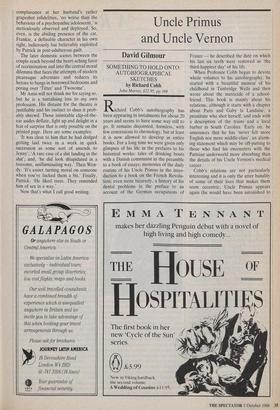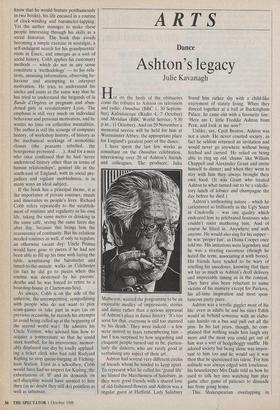Uncle Primus and Uncle Vernon
David Gilmour
SOMETHING TO HOLD ONTO: AUTOBIOGRAPHICAL SKETCHES by Richard Cobb
John Murray, L12.95, pp.168
Richard Cobb's autobiography has been appearing in instalments for about 20 years and seems to have some way still to go. It remains disjointed, formless, with few concessions to chronology, but at least it is now allowed to develop in entire books. For a long time we were given only glimpses of his life in the prefaces to his historical works: tales of drinking bouts with a Danish communist in the preamble to a book of essays; memories of the daily routine of his Uncle Primus in the intro- duction to a book on the French Revolu- tion; even more bizarrely, a history of his dental problems in the preface to an account of the German occupations of
France — he described the date on which his last six teeth were removed as 'the third-happiest day' of his life.
When Professor Cobb began to devote whole volumes to his autobiography, he started with a beautiful memoir of his childhood in Tunbridge Wells and then wrote about the matricide of a school- friend. This book is mainly about his relations, although it starts with a chapter about Paris and Gaby la Landaise, a prostitute who shot herself, and ends with a description of the trains and a local barber in South Carolina. Early on, he announces that he has 'never felt more English nor more middle-class', an alarm- ing statement which may be off-putting to those who find his encounters with the Parisian underworld more absorbing than the details of his Uncle Vernon's medical career.
Cobb's relations are not particularly interesting and it is only the utter banality of some of their lives that makes them seem eccentric; Uncle Primus appears again (he would have been astonished to
know that he would feature posthumously in two bOoks), his life encased in a routine of clock-winding and barometer-tapping. Yet the, author manages to make these people interesting through his skills as a social historian. The book thus avoids becoming a simple exercise in nostalgia, a self-indulgent search for his grandparents' roots in Essex, and emerges as a sort of social history. Cobb applies his customary methods — which do not in any sense constitute a 'methodology' — to his rela- tions, amassing information, observing be- haviour and attempting to interpret motivation. He tries to understand his uncles and aunts in the same way that he has tried to understand the brigands of la Bande d'Orgeres or pregnant and aban- doned girls in revolutionary Lyon. The emphasis is still very much on individual behaviour and personal motivation, and he wastes no time on collective mentalities. The author is still the scourge of computer history, of workshop history, of history as the mechanical workings of monolithic classes (the peasants rebelled, the bourgeoisie protested . . .). And for a man who once confessed that he had 'never understood history other than in terms of human relationships', genteel life in the south-east of England, with its social pre- judices and vigilant snobbishness, is in many ways an ideal subject.
If the book has a principal theme, it is the importance of private routines, rituals and itineraries in people's lives. Richard Cobb refers repeatedly to the establish- ment of routines and regularity in his own life, taking the same metro or drinking in the same café, seeing the same faces day after day, because this brings him the reassurance of continuity. But his relations needed routines as well, if only to regulate an otherwise vacant day: Uncle Primus would have gone to pieces if he had not been able to fill up his time with laying the table, scrutinising the barometer and timed-to-the-minute walks in Colchester (in fact he did go to pieces when this routine was destroyed by his parents' deaths and he was forced to retire to a boarding-house at Clacton-on-Sea).
As always, Cobb is on the side of the unheroic, the uncompetitive, sympathising with people who do not want to play team-games or take part in wars (as on previous occasions, he records his attempts to avoid being called up at the beginning of the second world war). He admires his Uncle Vernon, who advised him how to acquire a temperature so that he could shirk football, for his irreverence, memor- ably displayed one day by loudly applaud- ing a ticket clerk who had told Rudyard Kipling to stop queue-barging at Etching- ham Station. Even as a schoolboy, Cobb would have had no respect for Kipling; the exhortations of 'If' and its demands on self-discipline would have seemed to him then (as no doubt they still do) pointless as well as inhuman.



































































 Previous page
Previous page